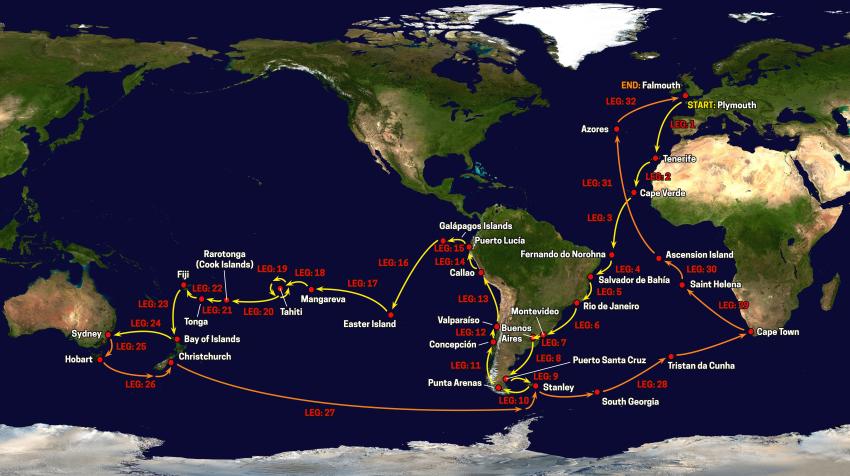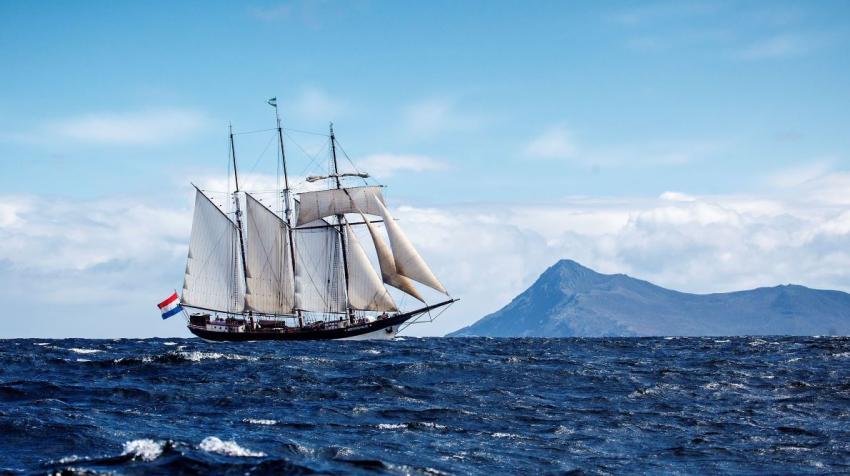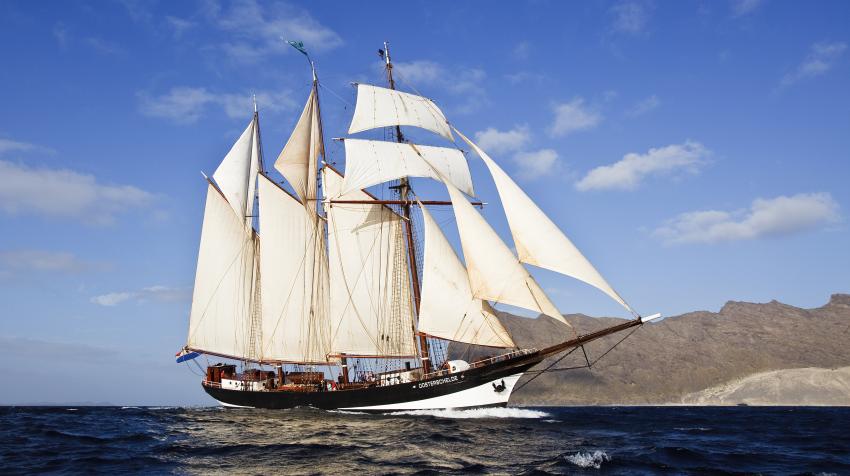The nineteenth-century voyage of HMS Beagle and the adventures of Charles Darwin have generated some of the richest stories in the history of science, ones filled with excitement and discovery. When the young naturalist boarded the ship in 1831 to sail around the world, neither he nor anyone else could have imagined how significant the experience would prove to be.
Darwin’s voyage seeded his theory of evolution by natural selection, which is regarded as one of the most important ideas in the history of human thinking. Yet Darwin would be astonished by the changes to the planet that have taken place over the last two centuries, and by the ongoing threats that are reshaping our world.
It is with this in mind that on 14 August 2023, the two-year DARWIN200 Global Voyage will begin aboard the 50-metre long, historic Dutch tall ship Oosterschelde.
Darwin was only 22 years of age when he set sail on the life-changing journey, famously stating that it was by far the most important event in his life; in fact, it would determine the course of his entire career. The aim of the DARWIN200 Global Voyage is to create a similarly transformative experience for 200 of the world's brightest young environmentalists, who have the potential to become the science, technology, engineering and mathematics (STEM) and conservation leaders of tomorrow and the catalysts that will change the future of planet Earth for the better.
A decade in the making, the DARWIN200 project centres on inspiring a new wave of exceptional environmental leaders by training and empowering some of the world’s top young (from 18 to 25 years of age) conservationists. As “Darwin Leaders”, these young people are being selected based on their accomplishments aimed at making the world a better place. These 200 Darwin Leaders are the inspiration behind the project’s name.

We are therefore seeking young conservationists with an irrepressible passion for preserving the natural world, who have already achieved great things under their own initiative as a result of their insatiable drive to make the planet a better place.
Some of our group have already been identified, and they all have truly impressive stories to tell. As teenagers they have set up nature reserves, replanted forests, rehabilitated ecosystems and spearheaded conservation efforts to save entire species.
Once assembled, the DARWIN200 will join the Oosterschelde in the same ports that Charles Darwin visited. They will be partnered with local conservationists to undertake an intensive training programme that is carefully designed to give them key skills they will need for a lifetime of conservation work.
One of the activities that each Darwin Leader will undertake will involve selecting an animal or a plant that Darwin studied to 1) study how the population of their chosen species has changed over the last two centuries, its current conservation status and existing threats; 2) examine and evaluate ongoing conservation efforts and establish whether they serve as sufficient safeguards (e.g. if the population is stable, in decline or recovering); and 3) design and carry out novel research and investigative work to develop new ideas for action to ensure that their chosen animal or plant species has a brighter future.

The intent is to give each Darwin Leader real-world experience in studying conservation subjects, build new skills in investigating and solving problems, and practice working in collaboration with experienced partners to develop new strategies to save wildlife.
Returning to their home countries, the Darwin Leaders will become environmental decision makers and drivers of change. Their careers will likely span the next 50 years, and working in countries across the globe, they will change the planet for the better as the living legacy of the DARWIN200 project. Just imagine what these young people will accomplish!
Onboard Oosterschelde, as it follows in Beagle’s wake, teams of young researchers will study ocean plastics and coral reef health, and undertake surveys of seabirds, whales and dolphins. The data collected will form part of a citizen-science outreach project, in which students and members of the public will be able to take part and analyse results and findings.
Every week for 100 weeks during the voyage, an immense platform of interactive experiments, research projects, STEM activities, lectures and Q&A sessions will be beamed live to audiences across the globe.

Participation in these weekly events, which will be known as “The World’s Most Exciting Classroom”, will be freely available to all. The programme of activities and resources is intended to engage millions of students and members of the global public.
DARWIN200 brings together an exceptional team, including some of the world’s most experienced conservationists, involving patrons Jane Goodall and Sylvia Earle, and key supporter Sarah Darwin (Charles Darwin’s great-great-granddaughter). Supported by a network of conservation groups from around the world, DARWIN200 will facilitate the two-way transfer of skills and knowledge between conservationists across the globe.
To test systems and perfect each part of the project, we undertook 20 weeks of test voyages sailing around the United Kingdom in 2021 and 2022 ahead of the start of the upcoming, two-year global expedition. The 40,000-nautical-mile route does include a few stops Darwin didn’t visit, and, for logistical reasons, Oosterschelde will return from Australia via Cape Horn rather than the Indian Ocean. But aside from these differences, DARWIN200 will visit every major port at which Charles Darwin made landfall.
Recent conservation projects have shown us time and again that it is not too late to remove many of the threats facing the natural world—if we act now. We can restore ecosystems and pull vulnerable species back from the brink of extinction. All we need is to mobilize passion and inspire change.
Under the tagline, “Change the World”, DARWIN200 aims to drive action for conservation, reinvigorate young people’s passion for discovery and learning, and ultimately, instil hope. By empowering and upskilling tomorrow’s generation, we can create a better future for the amazing natural world around us.
The UN Chronicle is not an official record. It is privileged to host senior United Nations officials as well as distinguished contributors from outside the United Nations system whose views are not necessarily those of the United Nations. Similarly, the boundaries and names shown, and the designations used, in maps or articles do not necessarily imply endorsement or acceptance by the United Nations.




